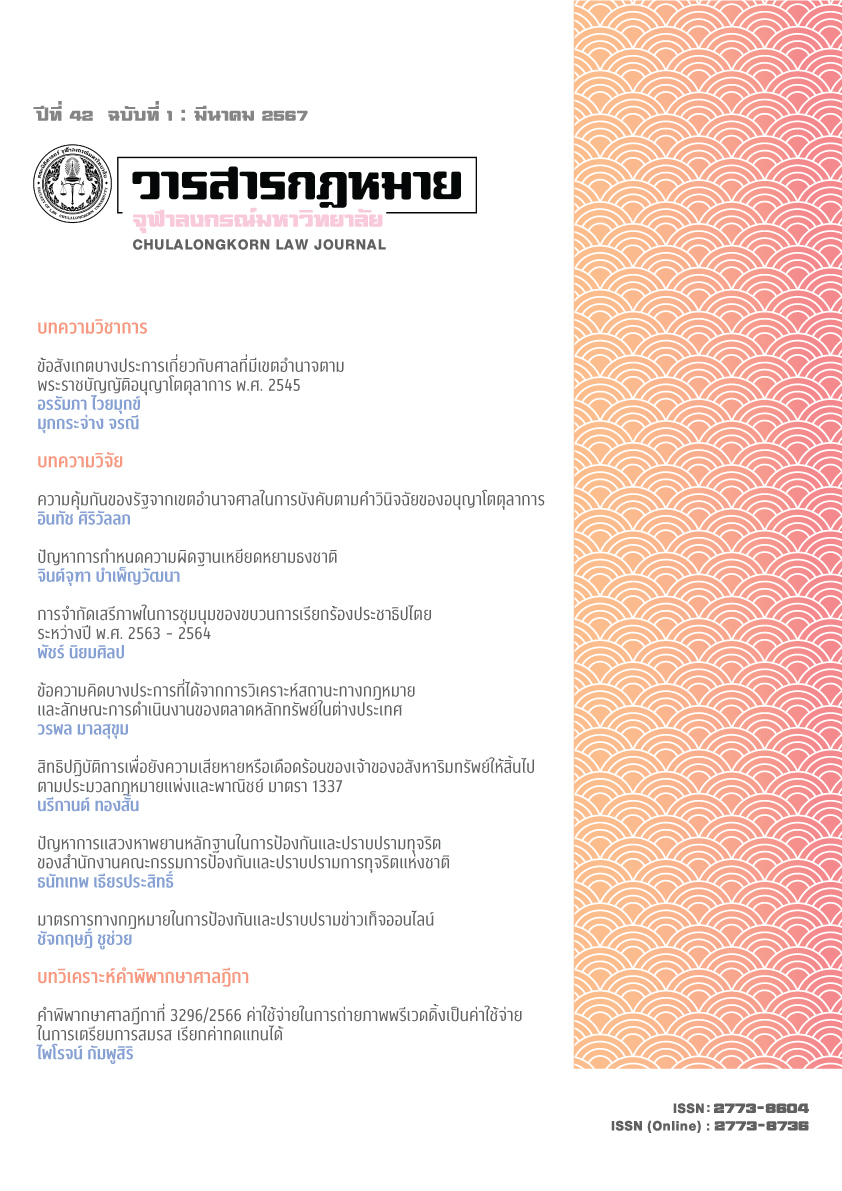มาตรการทางกฎหมายในการป้องกันและปราบปรามข่าวเท็จออนไลน์
Main Article Content
บทคัดย่อ
ปัญหาการเผยแพร่ข่าวเท็จออนไลน์ที่เพิ่มขึ้น จึงได้จัดทำการวิจัยเพื่อ (1) ศึกษาแนวคิด ทฤษฎี และหลักการของมาตรการทางกฎหมายในการป้องกันและปราบปรามข่าวเท็จ (2) ศึกษากฎหมายระหว่างประเทศตามอนุสัญญาอาชญากรรมไซเบอร์ และกฎหมายเกี่ยวกับการป้องกันและปราบปรามข่าวเท็จของประเทศมาเลเซีย สิงคโปร์ ฟิลิปปินส์ จีน และเยอรมนี (3) วิเคราะห์กฎหมายที่เกี่ยวกับการป้องกันและปราบปรามข่าวเท็จตามกฎหมายไทยเปรียบเทียบกับกฎหมายระหว่างประเทศ และกฎหมายเกี่ยวกับการป้องกันและปราบปรามข่าวเท็จของต่างประเทศ และ (4) นำผลการวิเคราะห์มาสังเคราะห์เป็นแนวทางในการแก้ไขปรับปรุงกฎหมายเกี่ยวกับการป้องกันและปราบปรามข่าวเท็จให้เหมาะสมและมีความชัดเจนยิ่งขึ้น การวิจัยนี้เป็นการวิจัยคุณภาพ โดยศึกษามาตรการอาญาและมาตรการปกครองในการป้องกันและปราบปรามข่าวเท็จออนไลน์ ทั้งที่เป็นเอกสารภาษาไทยและภาษาต่างประเทศ ผลการศึกษาพบว่า (1) สิทธิและเสรีภาพในการแสดงความคิดเห็นได้รับการรับรองตามรัฐธรรมนูญ แต่หากการใช้สิทธิและเสรีภาพกระทบกระเทือนหรือเป็นอันตรายต่อความมั่นคงของรัฐ ความสงบเรียบร้อยหรือศีลธรรมอันดีของประชาชน หรือละเมิดสิทธิหรือเสรีภาพของผู้อื่น รัฐสามารถเข้าแทรกแซงโดยการบัญญัติกฎหมายจำกัดสิทธิและเสรีภาพได้ (2) จากการศึกษาเปรียบเทียบกับกฎหมายของประเทศมาเลเซีย สิงคโปร์ ฟิลิปปินส์ จีน และเยอรมนี พบว่า การป้องกันและปราบปรามข่าวเท็จมีการบัญญัติเป็นกฎหมายเฉพาะ การกำหนดคำนิยามที่ชัดเจน กำหนดขอบเขตความรับผิดตามระดับความร้ายแรง ให้อำนาจแก่ฝ่ายปกครองในการออกคำสั่งในการจัดการกับข่าวเท็จ และกำหนดมาตรการสำหรับผู้ให้บริการในการกำกับดูแลตนเอง (3) ประเทศไทยไม่มีกฎหมายเฉพาะทำให้เป็นอุปสรรคต่อการป้องกันและปราบปรามข่าวเท็จออนไลน์ (4) จึงควรแก้ไขเพิ่มเติมพระราชบัญญัติว่าด้วยการกระทำความผิดเกี่ยวกับคอมพิวเตอร์ พ.ศ. 2550 โดยการกำหนดคำนิยามและขอบเขตการกระทำความผิดให้ชัดเจน ให้อำนาจแก่เจ้าหน้าที่รัฐมีคำสั่งทางปกครองในการจัดการกับข่าวเท็จ และกำหนดมาตรการและโทษปรับทางปกครองสำหรับผู้ให้บริการ
Article Details

อนุญาตภายใต้เงื่อนไข Creative Commons Attribution-NonCommercial-NoDerivatives 4.0 International License.
ลิขสิทธิ์และเนื้อหาในเว็บไซต์ของวารสารกฎหมาย (รวมถึง โดยไม่จำกัดเฉพาะ เนื้อหา รหัสคอมพิวเตอร์ งานศิลป์ ภาพถ่าย รูปภาพ ดนตรีกรรม โสตทัศนวัสดุ) เป็นกรรมสิทธิ์ของวารสารกฎหมาย และผู้ได้รับการโอนสิทธิทุกราย
1. วารสารกฎหมาย ให้อนุญาตให้คุณใช้สิทธิอันไม่เฉพาะเจาะจงที่สามารถถูกถอนเมื่อใดก็ได้ โดยไม่มีค่าใช้จ่าย ในการ
- เยี่ยมชมเว็บไซต์และเอกสารในเว็บไซต์นี้ จากคอมพิวเตอร์หรือเครื่องมือสื่อสารผ่านเว็บบราวเซอร์
- คัดลอกและจัดเก็บเว็บไซต์และเอกสารในเว็บไซต์นี้บนลงคอมพิวเตอร์ของคุณผ่านระบบความจำ cache
- สั่งพิมพ์เอกสารจากเว็บไซต์นี้สำหรับการใช้ส่วนตัวของคุณ
- ผลงานที่ได้รับการตีพิมพ์โดยวารสารกฎหมาย จุฬาลงกรณ์มหาวิทยาลัย ถูกคุ้มครองภายใต้ Creative Commons Attribution 4.0 International License ซึ่งอนุญาตให้ทุกคนสามารถคัดลอก แจกจ่าย ดัดแปลง ส่งต่อ ผลงานได้ ก็ต่อเมื่อผลงานและแหล่งข้อมูลได้รับการอ้างอิงอย่างเหมาะสม
2. วารสารกฎหมาย จุฬาลงกรณ์มหาวิทยาลัย สงวนสิทธิ์ไม่อนุญาตให้คุณใช้สิทธิอื่นใดที่เกี่ยวข้องกับเว็บไซต์และเอกสารบนเว็บไซต์นี้ เช่น การคัดลอก ดัดแปลง เปลี่ยนแปลง ส่งต่อ ตีพิมพ์ แจกจ่าย เผยแพร่ จัดแสดงในที่สาธารณะ ไม่ว่าจะในรูปแบบใดก็ตาม ซึ่งเว็บไซต์หรือเอกสารบนเว็บไซต์ โดยไม่อ้างอิงถึงแหล่งข้อมูลหรือโดยไม่ได้รับอนุญาตเป็นลายลักษณ์อักษรจากวารสารกฎหมาย จุฬาลงกรณ์มหาวิทยาลัย
3. คุณอาจขออนุญาตที่จะใช้เอกสารอันมีลิขสิทธิ์บนเว็บไซต์นี้โดยการเขียนอีเมลล์มายัง journal@law.chula.ac.th
4. วารสารกฎหมาย จุฬาลงกรณ์มหาวิทยาลัย เข้มงวดกับการคุ้มครองลิขสิทธิ์อย่างมาก หากวารสารกฎหมาย จุฬาลงกรณ์มหาวิทยาลัยพบว่าคุณได้ใช้เอกสารอันมีลิขสิทธิ์บนเว็บไซต์นี้โดยไม่ถูกต้องตามการอนุญาตให้ใช้สิทธิ ดังที่กล่าวไปข้างต้น วารสารกฎหมาย จุฬาลงกรณ์มหาวิทยาลัยอาจดำเนินคดีตามกฎหมายต่อคุณได้ เพื่อเรียกร้องค่าเสียหายที่เป็นตัวเงินและคำขอชั่วคราวให้คุณหยุดการใช้เอกสารดังกล่าว ทั้งนี้ คุณอาจถูกสั่งให้ชดใช้ค่าใช้จ่ายใดๆ ที่เกี่ยวข้องกับการดำเนินการตามกฎหมายนี้
หากคุณพบเห็นการใช้เอกสารอันมีลิขสิทธิ์ของวารสารกฎหมาย จุฬาลงกรณ์มหาวิทยาลัย ที่ขัดหรืออาจขัดต่อการอนุญาตให้ใช้สิทธิดังที่ได้กล่าวไปข้างต้น โดยเชื่อว่าได้ละเมิดลิขสิทธิ์ของคุณหรือของผู้อื่น สามารถร้องเรียนมาได้ที่ journal@law.chula.ac.th
เอกสารอ้างอิง
ANTI-FAKE NEWS ACT 2018 Part II OFFENCES 4.
décision n 88-248 DC du 17 janvier 1989 et nº 89-260 DC du 28 juillet 1989
Dustin P. Calvillo a, Ryan J.B. Garcia b, Kiana Bertrand a, Tommi A. Mayers. Personality factors and self-reported political news consumption predict susceptibility to political fake news. Personality and Individual Differences. Personality and Individual Differences. Sciencedirect. 2021.
FEUERBACH (P.J.A.). Lehrbuch des gemeinen in Deustchland gultigen Peinlichen Rechts. 3d ed. Giessen 1805
LORVELLEC (S.), “Les frontières entre infraction pénale et infraction administrative en Italie”, A.P.C., 1985, nº 8.
Robert C. Post “The Social Foundations of Defamation Law: Reputation andthe Constitution”, California Law Review Vol.74, No.3 (May 1986).
Supinya Klangnarong. Mapping Digital Media Southeast Asia Roundtable. Singapore: Singapore Internet Research Centre. 2014.
กรกริช มุ่งสวัสดิ์ และญาดา กาศยปนันทน์. การกำหนดความผิดเกี่ยวกับการแสดงความคิดเห็นผ่านสื่อสังคมออนไลน์ในประการที่ก่อให้เกิดความเสียหายต่อผู้อื่น. การประชุมนําเสนอผลงานวิจัยระดับบัณฑิตศึกษามหาวิทยาลัยรังสิต, ครั้งที่ 11, 2561.
กรมการปกครอง. สำนักบริหารการทะเบียน. [ออนไลน์] แหล่งที่มา: https://stat.bora.dopa.go.th/ stat/statnew /statMONTH /statmonth/#/displayData [26 ตุลาคม 2565]
กรรณิการ์ รอดมา. ปัญหาการบังใช้กฎหมายเกี่ยวกับสื่อลามกเด็กบนอินเตอร์เน็ต. วิทยานิพนธ์ปริญญามหาบัณฑิต คณะนิติศาสตร์ สถาบันบัณฑิตพัฒนบริหารศาสตร์, 2556
กระทรวงดิจิทัลเพื่อเศรษฐกิจและสังคม, “ศูนย์ต่อต้านข่าวปลอม” [ออนไลน์] แหล่งที่มา: https://www.depa.or.th/th/article-view [10 ตุลาคม 2565]
ขจีวรรณ ยงสวาสดิ์. มาตรการทางกฎหมายว่าด้วยการกำกับควบคุมข่าวปลอม กรณีศึกษานิยามและฐานความผิด. การศึกษาค้นคว้าอิสระปริญญามหาบัณฑิต คณะนิติศาสตร์ สถาบันบัณฑิตพัฒนบริหารศาสตร์, 2562
คณาธิป ทองรวีวงศ์. กฎหมายความผิดเกี่ยวกับคอมพิวเตอร์ เล่มที่ 1, พิมพ์ครั้งที่ 1. (กรุงเทพมหานคร: นิติธรรม, 2563)
ชนน ศิลปะรัศมี. เสรีภาพในการแสดงความคิดเห็นกับการคุ้มครองชื่อเสียงของบุคคลอื่นตามแนวคาวินิจฉัยของศาลสิทธิมนุษยชนแห่งยุโรป. วิทยานิพนธ์ปริญญามหาบัณฑิต มหาวิทยาลัยธรรมศาสตร์, 2560
ชาญชัย แสวงศักดิ์. โทษทางปกครอง: กฎหมายเปรียบเทียบ. พิมพ์ครั้งที่ 1 (กรุงเทพมหานคร: วิญญูชน, 2564)
ณัฐพัฒน์ เลิศประพจน์กุล. กลไกความร่วมมือทางอาญาระหว่างประเทศภายใต้กรอบของอนุสัญญาว่าด้วยอาชญากรรมทางคอมพิวเตอร์ของสภายุโรป. วิทยานิพนธ์ปริญญามหาบัญฑิต คณะนิติศาสตร์ จุฬาลงกรณ์มหาวิทยาลัย, 2555.
ธนพฤกษ์ ชามะรัตน์. สถานภาพองค์ความรู้ของแนวคิดเครือข่ายทางสังคม. [ออนไลน์] แหล่งที่มา: http://v-reform.org/u-knowledges/ [5 ตุลาคม 2565]
นิติพล เสตถาภรณ์ และภัฏฐิญา สิริบวรพิพัฒน์. “แนวทางการจัดให้มีกฎหมายควบคุมและคุ้มครองผู้ให้และผู้ได้รับผลกระทบจากผู้ให้ข่าวสารออนไลน์” Journal of Modern Learning Development, 6(3) 2564.
พจนานุกรม ฉบับราชบัณฑิตยสถาน พ.ศ.2554 [ออนไลน์] แหล่งที่มา: https://dictionary.orst.go.th/ [9 ตุลาคม 2565]
พาณิชย์ สดสี. แนวทางการป้องกันและมาตรการควบคุมการเผยแพร่ข่าวเท็จในเฟซบุ๊ก. หลักสูตรการป้องกันราชอาณาจักรรุ่นที่ 60. ประจำปีการศึกษาพุทธศักราช 2560-2561.
พิชิต วิจิตรบุญยรักษ์. สื่อสังคมออนไลน์: สื่อแห่งอนาคต. มหาวิทยาลัยกรุงเทพ. วารสาร Executive.
มนฤทัย ลิขิตธรรมนิตย์. บทบาทของผู้ประกอบการอินเตอร์เน็ตในการกำกับดูแลเนื้อหาอินเตอร์เน็ตภายหลังการประกาศใช้ พ.ร.บ. ว่าด้วยการกระทำความผิดเกี่ยวกับคอมพิวเตอร์ พ.ศ.2550. วิทยานิพนธ์ปริญญามหาบัณฑิต คณะนิติศาสตร์ จุฬาลงกรณ์มหาวิทยาลัย, 2552
มนฤทัย ลิขิตธรรมนิตย์. บทบาทของผู้ประกอบการอินเตอร์เน็ตในการกำกับดูแลเนื้อหาอินเตอร์เน็ตภายหลังการประกาศใช้ พ.ร.บ. ว่าด้วยการกระทำความผิดเกี่ยวกับคอมพิวเตอร์ พ.ศ .2550. วิทยานิพนธ์ปริญญามหาบัณฑิต คณะนิติศาสตร์ จุฬาลงกรณ์มหาวิทยาลัย, 2552
รัฐธรรมนูญแห่งราชอาณาจักรไทย มาตรา 25
รัฐบัญญัติ ฉบับที่ 51-711 ลงวันที่ 7 มิถุนายน ค.ศ. 1951 มาตรา 7
รัฐบัญญัติ ฉบับลงวันที่ 29 กรกฎาคม ค.ศ. 1881 เกี่ยวกับเสรีภาพของสื่อมวลชน มาตรา 32 วรรคสอง และสาม
รัฐบัญญัติว่าด้วยการกระทาผิดทางปกครอง (OWiG) มาตรา 121
รัฐสภาไทย. สำนักภาษาต่างประเทศ. งานแปลข่าวอาเซียน. “กฎหมายต่อต้านข่าวปลอมของมาเลเซียมีผลใช้บังคับแล้ว” [ออนไลน์] แหล่งที่มา: https://www.parliament.go.th/ewtadmin/ewt/parliament_parcy/ewt_dl_link.php?nid=48166&filename=foreign_news. [11 มกราคม .2566]
รัตนาภรณ์ จอมมูล. มาตรการทางกฎหมายในการกำกับควบคุมข่าวปลอมทางการเมืองบนโลกไซเบอร์. วิทยานิพนธ์ปริญญามหาบัณฑิต มหาวิทยาลัยเชียงใหม่, 2564
วุฒิสภาฟิลิปปินส์ Senate of the Philippines. การประชุมวุฒิสภาครั้งที่สิบเจ็ดของสาธารณรัฐฟิลิปปินส์. [ออนไลน์] แหล่งที่มา: https://legacy.senate.gov.ph/lisdata/2624822593!.pdf [9 ตุลาคม 2565]
ศุภวัฒน์ สิงห์สุวงษ์. เกณฑ์พิจารณาในการเลือกกำหนดโทษทางปกครองแทนโทษอาญา. สำนักงานศาลปกครอง. แหล่งที่มา: https://www.krisdika.go.th/data/article77/filenew/03-1-3.pdf. [10 กรกฎาคม 2566]
ศุภวัฒน์ สิงห์สุวงษ์. เกณฑ์พิจารณาในการเลือกกำหนดโทษทางปกครองแทนโทษอาญา. สำนักงานศาลปกครอง. [ออนไลน์] แหล่งที่มา: https://www.krisdika.go.th/data/article77/filenew/03-1-3.pdf. [10 กรกฎาคม 2566]
สิทธิที่ได้รับการรับรองในกติการะหว่างประเทศว่าด้วยสิทธิพลเมืองและสิทธิของการเมือง (ICCPR) ข้อ 19 (3) (a)
สุวัฒน์ เอมสัมฤทธิ์. การแสดงความคิดเห็นด้วยอคติผ่านข่าวปลอมผ่านสังคมออนไลน์: กรณีศึกษาการเลือกตั้งประเทศไทยในปี พ.ศ.2562. การศึกษาค้นคว้าอิสระปริญญามหาบัณฑิต มหาวิทยาลัยธรรมศาสตร์, 2561.
เสรีภาพที่ได้รับการรับรองในปฏิญญาสากลว่าด้วยสิทธิมนุษยชน ข้อ 19 และกฏิการะหว่างประเทศว่าด้วยสิทธิพลเมืองและสิทธิทางการเมือง (TCCPR) ข้อ 19


